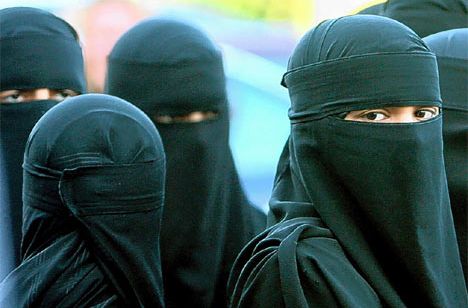
If European countries haven’t made it clear enough that Islamic beliefs are no longer welcome on the continent, Belgium is now the next in a long list of nations who how have a problem with its Muslim minority. Within the last three months a bill has been rushed through parliament to ban the Burka. It has now been passed by Belgium’s lower house of parliament and will ban women from wearing the full Islamic face veil in public. The law will ban any clothing that obscures the identity of the wearer in places like parks and on the street. Since no politician voted against the legislation, the bill goes to the Senate, where it is likely to face little opposition. Daniel Bacquelaine, the liberal MP who proposed the bill, said: “We cannot allow someone to claim the right to look at others without being seen.”
The new law has surprised many, this is because according to research only around 30 women wear this kind of veil in Belgium, out of a Muslim population of around half a million. The BBC’s Dominic Hughes said MPs backed the legislation on the grounds of security, to allow police to identify people. Those who break the law could face a fine of 15-25 euros (£13-£27) or a seven-day jail sentence.
The fundamentalist attempts to ban the Burka come at time when the Belgium coalition government – only 5 months in office, collapsed on April 26th 2010. The Burka ban in reality is the least of Belgium’s problems. The Belgium government collapsed due to the 5 party coalition government continued disagreements over electoral districting rules in the neighborhoods surrounding the bilingual capital, Brussels, between the country’s French- and Dutch-speaking communities. The communities from French Wallonia and Dutch Flanders provinces have a history of friction. The split between Wallonia and Flanders has evolved as Flanders pushed ahead in terms of population and economic power; the Dutch-speaking region currently accounts for around 60% of Belgium’s population. The crux of the problem, is that the economically stronger Flanders want to dissolve the remaining vestiges of Wallonia’s political advantages. But Francophones in Wallonia understand that this will lead to an end in economic transfer payments and their economic ruin.
These issues have been so divisive that commentators claim the in-fighting may lead to the country literally being ripped apart, each side being absorbed into France and the Netherlands depending on the community’s ethnicity. Any separation on a cultural basis is also a major concern for surrounding European countries which also suffer from internal divisions. This would encourage separatists like those in Catalonia and the Basque region in Spain, who have resorted to violence in their efforts to gain independence.
It is extraordinary that the Niqab is deemed a bigger threat than their toxic nationalism. Unfortunately this is not the first nor will this be the last time the Muslim community is used for politics. We are witnessing across Europe country after country banning parts of Islam. The centre-right MP Denis Ducarme said: “It is necessary that the law forbids the wearing of clothes that totally mask and enclose an individual. Wearing the burqa in public is not compatible with an open, liberal, tolerant society. I am proud that Belgium would be the first country in Europe which dares to legislate on this sensitive matter.”
Without the shade of the Khilafah we are witnessing irrelevant nations such as Belgium that have no global stature, playing politics with Islam. The Muslim rulers have shown time and time again that they are no defenders of the deen. There are numerous examples from Islamic history, where the enemies of Islam thought twice before they attempted to malign Islam because of the possible repercussions. The return of the Khilafah as promised by the prophet صلى الله عليه وسلم will strike fear into the enemies of Islam whenever they try to play politics with Islam and Muslims. Only the Khilafah is the salvation of the ummah.
